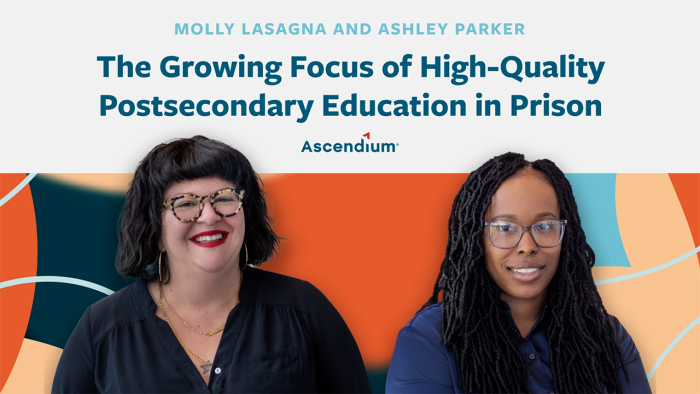
How Postsecondary Education in Prison Pathways Empower Incarcerated Learners to Reach Their Full Potential
April is Second Chance Month, which recognizes the importance of helping individuals, communities, and agencies across the country understand and appreciate their role in supporting the safe and successful reentry of millions of people returning from incarceration each year. In observance of Second Chance Month, we want to shine a light on the impactful work carried out year-round by Ascendium’s partners and others in creating pathways for incarcerated learners, both during their time in prison and beyond.
When we discuss pathways in postsecondary education in prison, we’re referring to intentional on-ramps and seamless transitions for incarcerated learners throughout their educational journey. This means designing clear pathways supported by essential wraparound services, enabling learners to seamlessly enter postsecondary education programs while incarcerated and obtain valuable credentials and workforce opportunities upon release.
This pathways work is reflective of the evolving landscape in postsecondary education, which increasingly emphasizes the need for institutions to forge strategic partnerships to integrate reentry services and professional development opportunities into their programs. Furthermore, these pathways are a response to federal Pell guidelines, which emphasize the importance of documenting evidence of incarcerated learners’ transitions to campus and their subsequent career outcomes.
Recent initiatives spearheaded by organizations such as Hudson Link for Higher Education in Prison and the LaunchCode Foundation serve as shining examples of this transformative work.
“Ascendium’s support for these initiatives underscores our belief that postsecondary education in prison is not an end goal but rather a significant milestone in an incarcerated learner’s journey toward upward mobility and a better life,” says Ascendium Program Officer Ashley Parker. “An incarcerated learner’s experience is often fragmented, lacking clear pathways into and through high-quality, high-value programs. We urge institutions considering postsecondary education initiatives in prison to adopt a comprehensive approach.”
This approach should encompass not only the establishment of effective programs within prison but also the facilitation of smooth transitions for incarcerated learners to continue their education on campuses outside the prison system. Such holistic strategies are essential for justice-impacted learners to access genuine opportunities for upward mobility.
Our dedication to postsecondary education in prison pathways reflects our commitment to breaking down barriers and fostering pathways to success for all learners from low-income backgrounds, regardless of their past experiences. Through collaborative efforts and innovative initiatives, we continue to strive toward a more inclusive and equitable future for all.
Want to learn more about this work? Here are three resources that help promote the creation and implementation of postsecondary education in prison pathways.
- The Normalizing Education Resource Center from Jobs for the Future (JFF) was created to ensure postsecondary education leaders and corrections professionals have open access to free resources needed to create high-quality postsecondary education in prison programs that lead to quality jobs and successful reentry.
- The Second Chance Business Coalition offers a variety of resources to help companies develop and implement successful second chance hiring programs.
- JFF’s Fair Chance Corporate Cohort guides companies through a twelve-week virtual program designed to build inclusive, competitive, and thriving workforces. Its focus is on fair chance hiring, which expands employment opportunities for people with criminal records.


